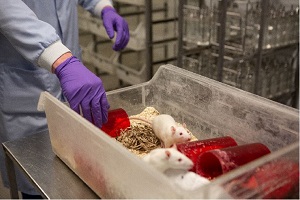How animal research at Reading helps tackle global health challenges
18 July 2019

Scientists at the University of Reading are fighting global health challenges including dementia and heart disease with the ongoing support of animal research.
New figures published today by the University of Reading (Thursday 18 July) show a reduction in the numbers of procedures with animals carried out by the institution, with a 36% decrease in 2018 compared to the year before. The University carried out 3,156 regulated procedures on animals in 2018, compared to 4,938 in 2017.
The latest numbers are published alongside national figures released by the Home Office, along with other institutions around the UK that conduct research using animals.
See the full statistics for animal research at Reading for 2018
Professor Parveen Yaqoob, Pro-Vice-Chancellor for Research and Innovation at the University of Reading, said:
“Heart disease, dementia and other diseases are among the biggest health concerns that humanity faces. More than seven million people live with heart and circulatory diseases alone and there cannot be a family anywhere that has not been affected in some way by the terrible costs of these illnesses.
“Medical science has made many breakthroughs in treating these and every other disease for which drugs are available. It is important to recognise where the use of animals has helped us to make progress.
“We take our responsibilities on animal welfare extremely seriously, and I look forward to a future when technology means that animals are not needed at all in scientific research. Until then, we will always seek to replace the use of animals with alternative methods whenever possible, reduce the numbers of procedures to the lowest possible, and refine our techniques to keep harm to a minimum.”
The 2018 statistics have been published by the University as part of its commitment to openness around animal research. As signatories on a concordat on openness on animal research, Reading has pledged to support a greater public awareness about understanding animal research, including the development of alternatives to using animals.
Case study: How ‘Robogut’ has helped replace animal tests
Professor Glenn Gibson, in the School of Chemistry, Food and Pharmacy at the University of Reading, is one of the world’s leading experts in gut microbiology, prebiotics and probiotics.
He and his team have developed experimental models of the human digestive system. These ‘Roboguts’ have in part replaced the need for animal models in experiments to understand the relationship between what we eat and the bacteria that live in our gut.
Running almost continuously at his labs in Reading since 1999, the systems have provided information that would otherwise have required thousands of procedures involving animals. Human studies are then carried out based on the results from these models. This has included research into irritable bowel syndrome (IBS), autism, obesity, elderly person's gut health, traveller's diarrhoea, and gastroenteritis.
The University of Reading already provides detailed information about the work it does on research that involves animals on our website, which was shortlisted in 2018 for an Openness in Animal Research award from Understanding Animal Research. This year, the University has also published for the first time details of data on the recorded severity of procedures, along with explanations of what this means, plus full summaries of every project for which it currently has a licence from the Home Office.
In addition, next week the University will highlight a number of different areas where it conducts research with animals, showing how this work helps to advance knowledge in critical areas of human health and environmental protection.
https://www.reading.ac.uk/research/research-environment/animal-research.aspx
